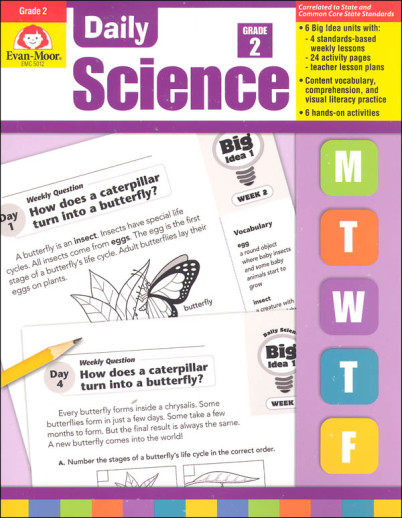We use cookies to make your experience better. To comply with the new e-Privacy directive, we need to ask for your consent to set the cookies. Learn more.
Daily Science Grade 2
The Grade Level Teacher Book provides Teacher pages, Student Activity pages that are reproducible (for one classroom), and an answer key. This course covers: life cycles, Animal/plant reproduction, atmosphere, water cycle, weathering and erosion, earth's rotation, moon phases, sound and magnets.
Fit standards-based science instruction into your curriculum!
Help your grade 2 students develop a genuine understanding of standards-based scientific concepts and vocabulary using the 150 engaging activities in Daily Science! A variety of rich resources, including vocabulary practice, hands-on science activities, and comprehension tests in multiple-choice format, help you successfully introduce students to earth, life, and physical science concepts.
30 weeks of instruction cover the following standards-based science topics:
Big Idea 1: Different kinds of living things have different life cycles.
Week 1: Why do kangaroos carry their babies in pouches?
Week 2: How does a caterpillar change into a butterfly?
Week 3: How do tiny seeds turn into giant trees?
Week 4: Why do some plants have flowers?
Week 5: Unit Review
Big Idea 2: Plants and animals look a lot like their parents.
Week 1: What's the difference between foxes and wolves?
Week 2: Why can't an apple tree grow oranges?
Week 3: How can a spotted cat have striped kittens?
Week 4: Why don't all grapes have seeds?
Week 5: Unit Review
Big Idea 3: Earth contains rock, water, and air. People use all of these things.
Week 1: How far up does the sky reach?
Week 2: How much water is there on Earth?
Week 3: Why do beaches and deserts have sand?
Week 4: Why do people recycle?
Week 5: Unit Review
Big Idea 4: The sun, moon, and stars all have predictable patterns of movement.
Week 1: What happens to the sun at night?
Week 2: Why aren't stars always in the same part of the sky at night?
Week 3: Is the moon a planet?
Week 4: Why does the moon change shape?
Week 5: Unit Review
Big Idea 5: Sounds are made by vibrating objects. Sounds can travel through solids, liquids, and gases.
Week 1: How do crickets chirp?
Week 2: Where do echoes come from?
Week 3: Does sound travel underwater?
Week 4: How do animals without ears hear?
Week 5: Unit Review
Big Idea 6: Magnets make some things move without touching them. They also attract or repel other magnets.
Week 1: Why does a magnet stick to a refrigerator but not a window?
Week 2: How can magnets move things without touching them?
Week 3: Why are some magnets stronger than others?
Week 4: How does a compass work?
Week 5: Unit Review
Providing daily supplemental activity pages for elementary to early middle school, this Evan-Moor series reinforces scientific knowledge, reading comprehension and vocabulary development. Short, 10-15-minute activities organized around reading passages are easy to implement and schedule into your educational day.
Organized into 6 topical Big Ideas Units each investigating a question from life, earth, or physical science and based on state standards. Each Unit is 5 weeks long, with Weeks 1-4 providing teaching on the key information. Weekly lessons begin with a Teacher Page that provides additional information and activity ideas. Student Activity pages follow. Days 1-4 include a variety of writing, comprehension, vocabulary, critical thinking, visual literacy, oral language practice or hands-on activities. Day 5 is review. Week 5 is considered a Unit review with comprehension questions, visual literacy activity, vocabulary review and a hands-on activity related to the previous 4 weeks. From a secular publisher, there is evolutionary content. ~ Deanne
The Grade Level Teacher Book provides Teacher pages, reproducible (for one classroom) Student Activity pages, and an answer key. 192 pgs. pb
The Student Practice Book (Student Workbook) provides only the Student Activity pages. This book is not reproducible and does not include the answer key. It is designed to be used with an additional student or instead of copying the Student pages from the Teacher book.
| Product Format: | Paperback |
|---|---|
| Brand: | Evan-Moor |
| Grade: | 2 |
| ISBN: | 9781596734203 |
| EAN/UPC: | 023472050120 |
| Length in Inches: | 10.875 |
| Width in Inches: | 8.5 |
| Height in Inches: | 0.5 |
| Weight in Pounds: | 1.125 |

